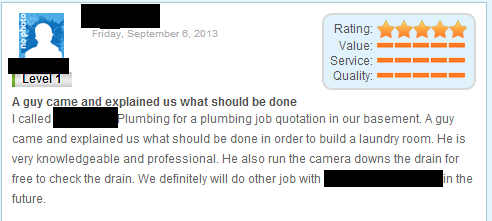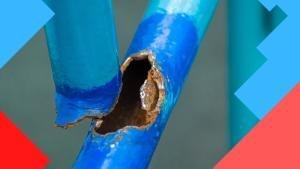Detecting Fake Online Reviews
Consumers who are relying on online reviews may be in for a surprise: there are a lot of fake online reviews out there.
Many Internet users access review sites to find a business they can trust. In an ideal world, these reviews would all be genuine, and should guide consumers towards businesses that provide good products and services. And at the same time, they should hopefully steer consumers away from businesses who do not provide the quality of goods and service that they claim to.
Are Review Sites Reliable?
Millions of Internet users consult with review sites like Angie’s List and Yelp to read reviews about companies before contacting them. But how many of these reviews are real, and how many are written by the business themselves?
Take a look at this screenshot:

Note the bad English, bad grammar, bad writing. This review was not written by a regular customer or reviewer: it was generated by the company itself. And the writing looks like it was outsourced overseas, and was not written by a native English speaker.
Unfortunately, some businesses resort to creating and posting online reviews about their own business. This dilutes the value of the review sites containing these reviews. If people sense that there are too many fake reviews on any particular site, consumers will soon stop using those review sites.
Here are some things to watch out for when trying to determine if online reviews are real or fake:
- Read other reviews about the same company – are they written in the same style?
Check out some of the reviews about the company you are researching. Are there other reviews which are written in a similar style to others? If so, this is your first indication that the company itself created some/all of those reviews. Different people write in completely different ways: if reviews are written in a similar style, they are probably created by the same person. - Superlatives – Are there too many?
If each review unequivocally states that this company is “the best” and “the greatest” with “amazing” products and “excellent” customer service, these reviews are probably created by the company. A few reviews containing a few superlatives are probably okay – but if there is nothing but superlatives, chances are those reviews are fake. - Read the writing – does it make sense?
Sometimes, a company will create it own (fake) review, then outsource it overseas to generate additional similar reviews. This is your biggest clue: if you see a review about, say, a plumbing company, and it says that this is a “full service plumbing company” and then you read in another review that this is a “full aid pipes association”, then you know it’s a fake review, created overseas by a non-native English speaker, using a program called a “spinner”, which changes every word to something similar, but not necessarily the correct word/s. In the above case, “full aid” is related to “full service” but not closely enough, “pipes” has something to do with plumbing but isn’t plumbing, and “association” is similar to “company” but not quite. Finding nonsense is your first clue that the review has been created by someone, often a third party, who was hired by the company to create these reviews.
The bottom line? Good reviews are helpful, fake reviews are not. Use your nose – learn to “sniff out” fake online reviews. And please note: review sites like Yelp make it quite clear that companies may not offer you any incentives or economic benefits, discounts, or price reductions in exchange for your creating a review about them.



